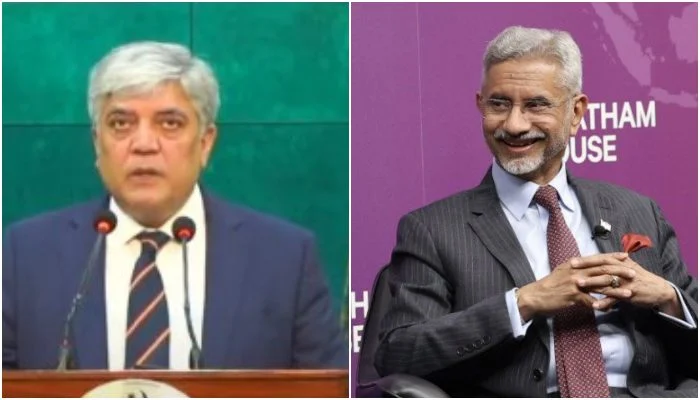Pakistan has firmly rejected the comments made by Indian External Affairs Minister, Subrahmanyam Jaishankar, regarding Jammu and Kashmir during an event at Chatham House in London.
At his weekly briefing in Islamabad on Thursday, Foreign Office Spokesperson Shafqat Ali Khan stated that Jaishankar’s remarks misrepresented the facts on the ground and violated international law.
He reiterated that Jammu and Kashmir is a disputed territory, recognized as such internationally. The UN Security Council resolutions clearly mandate that the final status of Jammu and Kashmir should be determined through a fair and impartial plebiscite under the UN’s supervision. He emphasized that India’s stance does not alter this reality.
Khan also stressed that any electoral process carried out under the Indian Constitution cannot replace the right to self-determination for the Kashmiri people. He further stated that the longstanding grievances of the Kashmiri people cannot be addressed through economic measures imposed under force.
The Spokesperson called on India to withdraw from the territories of Jammu and Kashmir that it has occupied for the past 77 years, rather than making unfounded claims about Azad Jammu and Kashmir. He stressed that a peaceful resolution of the Jammu and Kashmir dispute, in line with the UN Security Council resolutions and the wishes of the Kashmiri people, is vital for long-term peace in South Asia.
In response to a question, Khan noted the increasing number of provocative statements from Indian leaders regarding Azad Jammu and Kashmir, which he said were based on false claims. He emphasized that these claims are refuted by historical facts, legal principles, and the current situation on the ground. He advised Indian leaders to focus on implementing UN resolutions on Kashmir rather than indulging in baseless rhetoric.
Regarding the recent arrest of Shareefullah, a top commander of the Islamic State Khorasan Province (ISKP), and his subsequent handover to the United States, Khan said that intelligence cooperation between Pakistan and the US has been ongoing for a long time.
He highlighted the significant successes achieved by Pakistani law enforcement agencies in their operations against terrorist groups, including ISKP. He noted that Shareefullah was handed over to the US in accordance with UN Security Council resolutions and emphasized that this cooperation reflects Pakistan’s zero-tolerance policy toward terrorism. He added that intelligence collaboration has been a longstanding practice, not a one-time occurrence.





